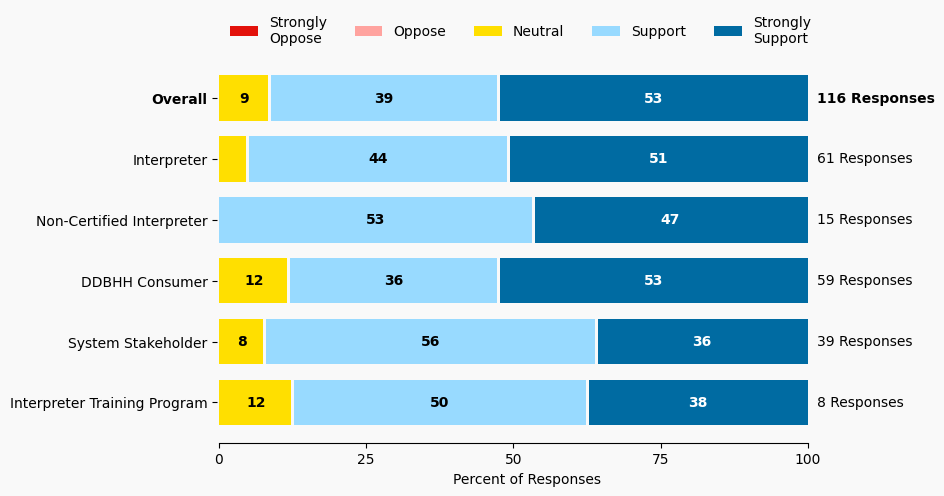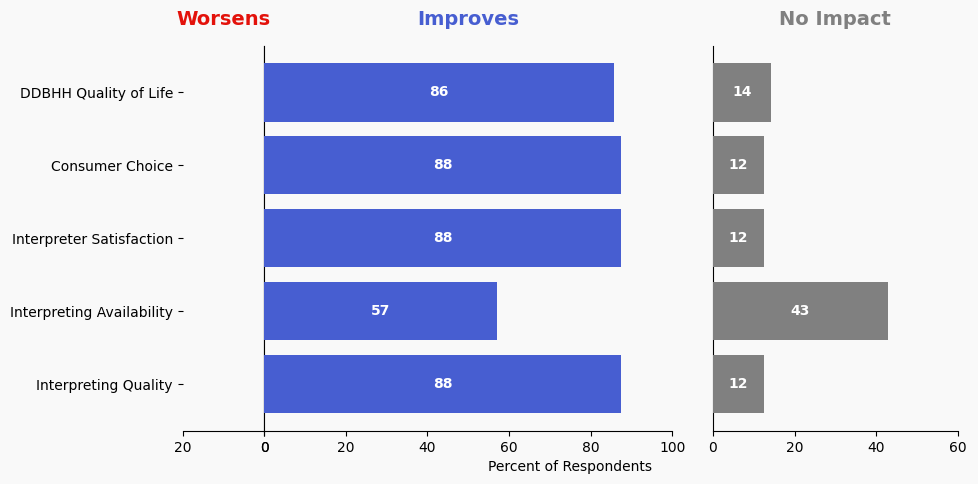106 Teach Freelancing and People Skills in ITPs
Issue: Consumers and seasoned interpreters describe some newer interpreters as not having people skills, soft skills or freelance business skills.
Proposed Solution: Review what is taught to ITP students, both directly and indirectly. If people skills and freelancing business skills are not being taught, incorporate both in the interpreting curriculum.
Expected outcome: Interpreting graduates may be more prepared for running their freelance business; consumers may have better interpersonal experiences with interpreters.
Who is impacted: Consumers, interpreters
Timeline: 6 months

Summary of Support Image Description
The stacked bar charts show how respondents rated their level of support and the total number of responses. The percentage for the five support levels is shown from left to right: Strongly Oppose (Dark Red), Oppose (Light Red), Neutral (Yellow), Support (Light Blue), and Strongly Support (Dark Blue).
Respondents may identify with multiple subgroups. The overall level of support is:
Overall
Strongly Oppose: 0%
Oppose: 0%
Neutral: 9%
Support: 39%
Strongly Support: 53%
Click to see the detailed image description for each subgroup.
Interpreter
Strongly Oppose: 0%
Oppose: 0%
Neutral: 5%
Support: 44%
Strongly Support: 51%
Non-Certified Interpreter
Strongly Oppose: 0%
Oppose: 0%
Neutral: 0%
Support: 53%
Strongly Support: 47%
DDBHH Consumer
Strongly Oppose: 0%
Oppose: 0%
Neutral: 12%
Support: 36%
Strongly Support: 53%
Interpreter Training Program
Strongly Oppose: 0%
Oppose: 0%
Neutral: 12%
Support: 50%
Strongly Support: 38%
System Stakeholder
Strongly Oppose: 0%
Oppose: 0%
Neutral: 8%
Support: 56%
Strongly Support: 36%
Overview of Respondents Opting for In-Depth Solution Analysis
After indicating their support level, 6% of the 116 respondents opted in to further assess whether the solution would worsen or improve on five metrics. Of the opt-in reviewers (7 respondents), 100% supported the solution, 0% were neutral on the solution, and 0% opposed the solution.
The remaining 109 respondents did not opt in to further assess the solution. Of these people, 90% support the solution, 9% were neutral on the solution, and 0% opposed the solution.
Reviewer Evaluation of Solution Effectiveness

Solution Effectiveness Image Description
The stacked bar charts show how respondents assessed the effectiveness of this solution based on five metrics. For each metric, the percentage of respondents is shown from left to right: Worsens (Red), Improves (Blue), No Impact (Gray).
DDBHH Quality of Life
Makes It Worse 0%
Makes It Better 85%
No Impact 14%
Interpreter Satisfaction
Makes It Worse 0%
Makes It Better 87%
No Impact 12%
Consumer Choice
Makes It Worse 0%
Makes It Better 87%
No Impact 12%
Interpreting Availability
Makes It Worse 0%
Makes It Better 57%
No Impact 42%
Interpreting Quality
Makes It Worse 0%
Makes It Better 87%
No Impact 12%
Reviewer Feedback and Insights
Interpreter
Comments from Interpreters suggest that some ITPs already include classes on business skills and ethics, but have a need for more in-depth training in areas like contract negotiation and bookkeeping. One comment notes the challenges in learning complex business skills, suggesting ongoing community support and mentorship is necessary. Another comment raises concerns aound the limited retention of people skills taught in academic settings.
Deaf, DeafBlind, Hard of Hearing
Comments from DDBHH Consumers emphasize reviewing current ITP curricula to identify gaps and avoid redundancy, but generally support the teaching of people skills and business management in the curriculum. One comment believes that the reduction of interpreters’ administrative stress would lead to increased interpreting quality.
System Stakeholder
Comments from System stakeholders indicate that these skills are already taught in ITPs, and covered in programs that support new interpreting graduates such as MERGE. One comment notes that there is already an ITP accreditation system to ensure that business skills are taught.
PREVIOUS SOLUTION
105 Emphasize ITP Curricula to Aid in Certification
Issue: Students graduating from ITPs struggle to gain certification.
NEXT SOLUTION
107 Centralize Mentorship/Internship Program Information on a Website
Issue: Interpreters need more information about mentoring, internships and support opportunities.
Leave a Reply